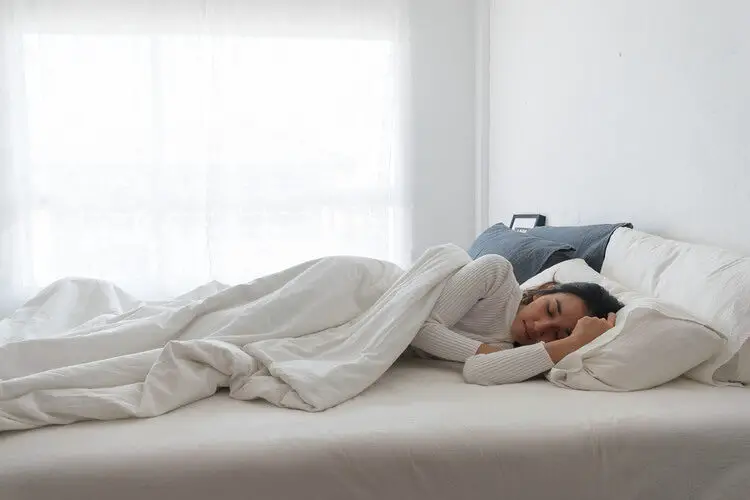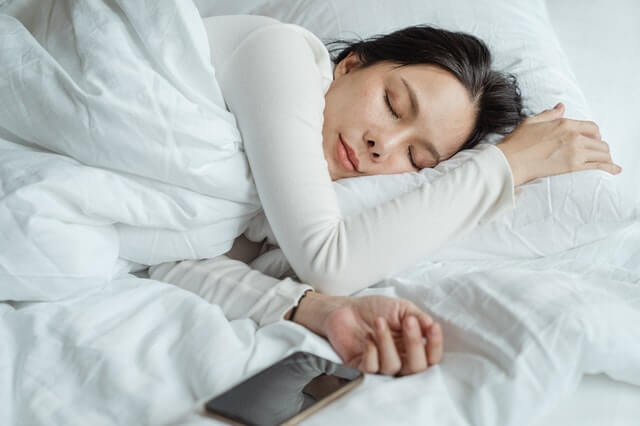Anyone who’s ever had a bad night’s sleep will tell you just how much it negatively affects your life.
Sleeping poorly can lead to physiological effects in your body (dark circles under your eyes, a sense of lethargy, etc.) as well as cranky moods and a lack of mental clarity. If it’s happened to you, you know you’ll do anything to break the cycle of bad sleep and get to the root cause of it.
When that cause is indigestion, there is hope: A simple change to the position you sleep in may help ease your digestion problems, resulting in a better night’s sleep with less intestinal irritation.
Read on to find out which side you want to sleep on to aid with digestion and more benefits of side sleeping.
Why You Feel Digestional Discomfort When You Sleep
As you might remember from biology class, digested food has a particular path it takes through your body. It goes down the esophagus, into the stomach, through the small intestine, and then passes through the colon before exiting the body.1
When the food you eat moves too slowly through that digestive path, it causes a backup. That backup is what leads to bloating, gas, and bowel issues – all of which can manifest themselves in digestional discomfort when you sleep.
Laying down can exacerbate this issue because you no longer have gravity in your favor to help the food move more swiftly through your system.
Sleep on Your Left Side
Image courtesy of Pexels
Some experts believe that sleeping on your left side can help alleviate digestional distress that keeps you up at night.2
There is one big reason that sleeping on your left side might help, and it has to do with a little flap. That flap is called the ileocecal valve, and it separates the small intestine from the colon, which is the first part of the large intestine.
The ileocecal valve is located on the right side of your abdomen. When you sleep on your left side, your right side is obviously higher than your left. At that point, gravity kicks in.
Gravity can help the ileocecal valve to open more often, which in turn pushes the food waste through the digestive system quicker.3 The quicker it moves through the system, the less digestional distress you’ll feel.
Are There Any Other Benefits of Side Sleeping
There are two other benefits that may come as a result of side sleeping.
- Less heartburn: The lower part of your digestive system isn’t the only part that can flare up when you lie down. The upper part of your digestive system can cause you issues as well.
Heartburn happens when the muscle between your esophagus and your stomach allows acid from your food to travel back up instead of staying in the stomach. Laying on your left side keeps the digestional fluids lower than the esophagus, which may help to reduce the amount of fluid that goes back into the esophagus.4 - Reduced snoring: While it’s not related to your digestion, snoring is still important to mention because it can also keep you (and your partner) from getting a good night’s sleep. Snoring happens when your mouth is open and your tongue falls back into your throat, partially obstructing your airway. If you sleep on your side, this obstruction is less likely to happen.
How to Be Comfortable Sleeping on Your Left Side
Image courtesy of Pixabay
Even knowing how helpful sleeping on your left side can be for your digestion, some people find side sleeping to be a huge challenge.
Here are four ways you can help to become more comfortable sleeping on your left side.
- Get the right mattress topper. When you sleep on your side, your shoulder and hip will absorb more pressure. If your mattress is firm, you’ll want to get a larger, more cushiony mattress topper that can offer extra depth for your shoulder and your hip to be comfortable. If your mattress is already softer, you’ll want to get a thinner topper since you should have to compensate as much for what’s lacking in the mattress.
- Use the right pillow for your head. You want to use one that’s thick enough to cover the distance between your neck and the end of your shoulder. The firmness of the pillow is also important as it should be firm enough to support your head and neck through the night.5
- Sleep with a pillow in between your knees. Doing this will help to keep your whole body aligned. When your body is aligned, there is less stress on your back and hips, allowing you to be more comfortable and stay on your side throughout the night.6 The pillow should be firm and able to hold its shape. Something like this knee pillow would be ideal.
The more you sleep on your left side, the more natural it will become for you. If you go to sleep on your left side and wake up in any other position, try to roll back over onto your left side. Eventually, your body will accept this position as normal for you and you’ll be able to stay in it for longer periods of time throughout the night, helping to keep your digestive system from creating sleep issues for you.
Article Sources
Healing Daily uses only high-quality sources, including peer-reviewed studies, to support the facts within our articles. Read our editorial process to learn more about how we fact-check and keep our content accurate, reliable, and trustworthy.
- Niles GM. Some Thoughts Concerning Sleep and Digestion. JAMA. 1909;LII(26):2096–2097. doi:10.1001/jama.1909.25420520010002b
- Kaltenbach T, Crockett S, Gerson, L. Are Lifestyle Measures Effective In Patients With Gastroesophageal Reflux Disease? Jamanetwork.com. Arch Intern Med. 2006;166(9):965-971. doi:10.1001/archinte.166.9.965
- Bio-K-Plus Company. How to Know the Best Sleeping Position for Your Digestion. biokplus.com. Published December 22, 2020. Accessed April 19, 2021.
- Person, Erik; Rife, Christopher; Freeman, Janice; Clark, Aaron; Castell, Donald O. A Novel Sleep Positioning Device Reduces Gastroesophageal Reflux. Journal of Clinical Gastroenterology. 49(8); Sept 2015. pp 655-659. doi:10.1097/MCG.0000000000000359
- Iyo, Jenny. Best Pillows for Side Sleepers of 2021. Sleepfoundation.org. Published April 2, 2021. Accessed April 19, 2021.
- Cunningham L, Turley Jr. R, Joseph T. Good Sleeping Posture Helps Your Back. urmc.rochester.edu. Accessed April 19, 2021.





